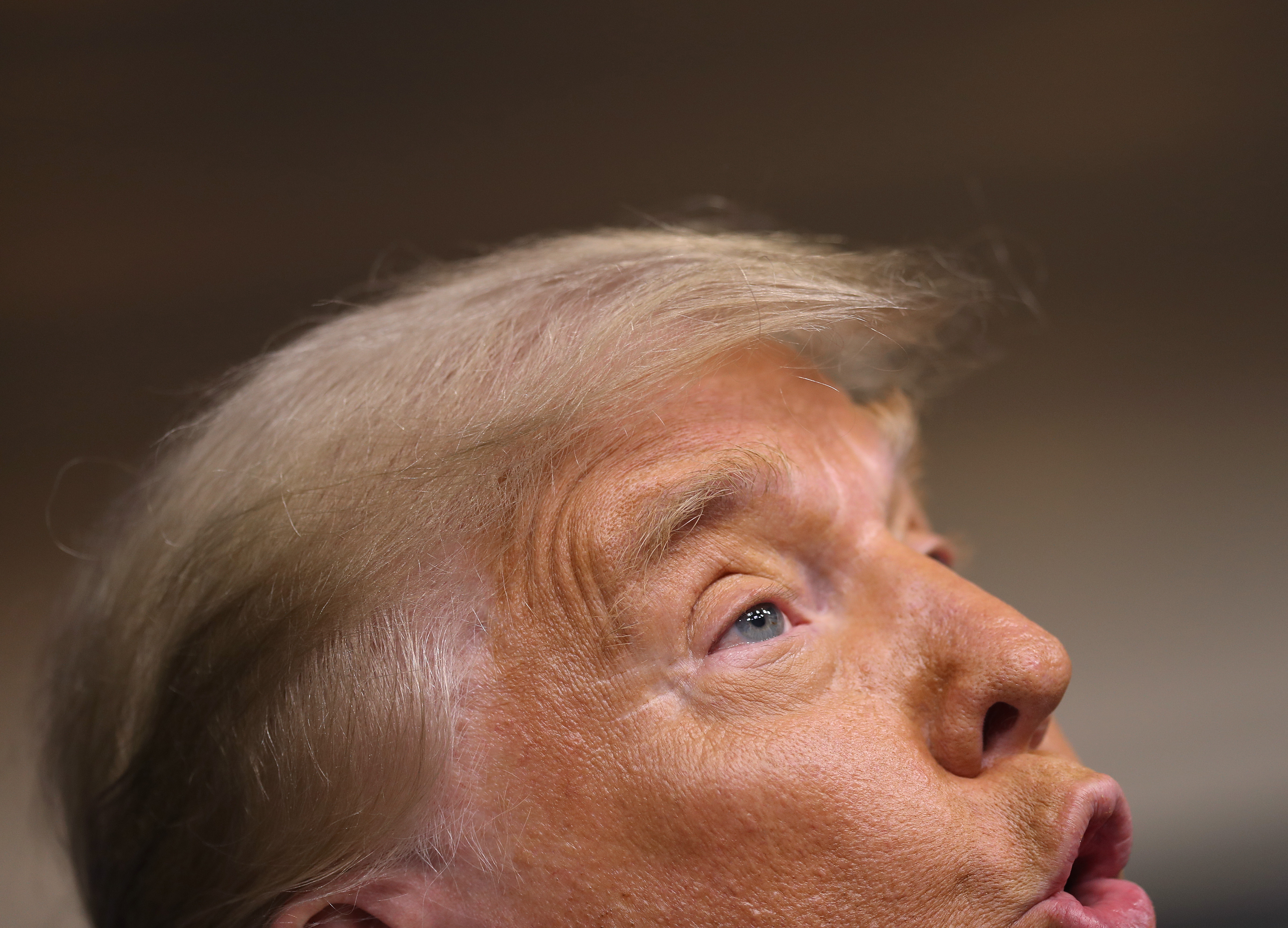Donald Trump's biggest legal threats
The former president is facing a host of separate challenges from around the country


A free daily email with the biggest news stories of the day – and the best features from TheWeek.com
You are now subscribed
Your newsletter sign-up was successful
This past May, following weeks of closely watched testimony and legal wrangling, Donald Trump became the first former president in United States history to be criminally convicted in a jury trial, netting 34 separate felony guilty verdicts for falsifying business records related to hush money payments concealing his alleged affair with adult film star Stormy Daniels.
The convictions, which Trump has steadfastly rejected, are not simply a historic first. They are also the tip of a larger iceberg of legal peril for the former president as he nears the end of another bid for the White House. Not only has Trump also been found liable in the assault of longtime Elle magazine columnist E. Jean Carroll, but he faces two separate federal indictments for his role in working to subvert the results of the 2020 presidential election, as well as improperly storing classified documents at his Mar-a-Lago estate. In each instance, Trump has publicly maintained his innocence.
These cases fueled an ongoing debate over Trump's many vulnerabilities — both legal and electoral — for the 2024 presidential election. At the same time, Trump has used his legal peril as a springboard for a renewed fundraising push to supporters, even as rivals and detractors seize upon his criminal vulnerability.
The Week
Escape your echo chamber. Get the facts behind the news, plus analysis from multiple perspectives.

Sign up for The Week's Free Newsletters
From our morning news briefing to a weekly Good News Newsletter, get the best of The Week delivered directly to your inbox.
From our morning news briefing to a weekly Good News Newsletter, get the best of The Week delivered directly to your inbox.
While Trump has deftly avoided (and in some cases even utilized) lawsuits and threats of criminal action for his own purposes in the past, he is now for the first time in his career facing a very real possibility of both time in prison, and further convictions for a host of allegations: some related, some disparate, and all serious.
These are the major judicial challenges currently threatening Donald Trump:
Federal investigation into classified documents
In June of last year, Justice Department Special Counsel Jack Smith charged Donald Trump with 37 felony counts relating to his alleged mishandling of a tranche of highly classified documents found at the former president's Mar-a-Lago estate in Florida, following a dramatic FBI raid on the property in August 2022. Per Smith's indictment, Trump was "not authorized to possess or retain those classified documents," nor was the property an "authorized location for the storage, possession, review, display or discussion of classified documents." The bulk of the charges against Trump are for "willful retention of national defense information," although he has also been charged with making false statements to investigators, as well as conspiring to obstruct justice. In late June, Smith filed a superseding indictment against Trump with several additional charges, including allegations that Trump had worked to destroy evidence in the case. After initially setting a court date for this past spring, in July Florida Judge Aileen Cannon granted Trump's attorneys request to dismiss the case entirely, claiming Smith's position as Special Counsel "violates the Appointments Clause of the United States Constitution." Smith has since filed an appeal to reinstate the case, which is still pending.
Federal investigation into election interference and Jan. 6
On August 1, 2023, Smith announced a second slate of charges against Trump for his role in working to subvert the results of the 2020 presidential election, and the violent insurrection that ensued at the Capitol complex on Jan. 6, 2021. The 45-page indictment, issued in the U.S. District Court for the District of Columbia, charges Trump with four counts of conspiracy to defraud the United States, conspiracy to obstruct an official proceeding, obstruction of justice and witness tampering. In a speech delivered shortly after the indictment was made public, Smith described Trump's attempt to disrupt a "bedrock function of the U.S. government" as having been knowingly "fueled by lies."
A free daily email with the biggest news stories of the day – and the best features from TheWeek.com
Trump's election interference case is being presided over by U.S. District Judge Tanya Chutkan, who is widely regarded as one of the district's most strict sentencers for convicted Jan. 6 defendants. The case has been significantly postponed over questions of presidential immunity — claims of which were denied by the DC Circuit Court of Appeals but then affirmed by the United States Supreme Court this past July. Smith has since filed slightly altered charges to make the case that "Trump's prosecution is not off limits because he was acting as a private candidate for office — not a commander in chief — when he schemed to overturn the will of voters," The Associated Press said. Trump's legal team has been given until November 7 — two days after polls close in the 2024 election — to respond to the latest iteration of Smith's charges.
2020 election subversion in Georgia
After more than a year of investigating alleged efforts by Trump and his allies to manipulate and overturn his 2020 electoral loss in the state of Georgia, Fulton County District Attorney Fani Willis in August 2023 handed up what is perhaps the most acute legal threat the former president faces today — a 97-page indictment detailing 13 felony criminal counts against Trump and dozens more for his 17 co-conspirators, including Rudy Giuliani and Mark Meadows. At its core, the Georgia indictment alleges that Trump and others engaged in a "criminal enterprise" to subvert the 2020 election in violation of the state's expansive Racketeer Influenced and Corrupt Organizations (RICO) Act. It cites a number of well-publicized incidents, including Trump's personal call to Georgia's Republican Secretary of State Brad Raffensperger demanding he "find" more than 11,000 votes in Trump's favor, as well as other acts like the breaching of voting machines and endorsement of false electoral college votes.
Because the charges brought against Trump are violations of state, rather than federal law, the former president has little opportunity for a potential pardon should he ultimately be convicted. He has maintained his innocence throughout, explaining at a brief press conference following his surrender at the Fulton County Jail that he had "every single right" to challenge the 2020 election, and had done "nothing wrong at all," per NBC News.
Willis' prosecution against Trump has been repeatedly delayed in large part thanks to an effort by the former president's legal team to have Willis removed entirely due to her potentially inappropriate relationship with one of her subordinate prosecutors. Although the subordinate has since resigned from the case, Willis has refused to recuse herself, per Trump's legal team's requests. The Georgia Court of Appeals is now scheduled to hear arguments as to whether Willis should remain involved in the prosecution in early December, 2024, a full month after polls close on election day.
No matter when the case does ultimately go to trial, it could differ from Trump's other legal woes in one key way: It may be the only one televised, NBC News said.
Author E. Jean Carroll's lawsuits over alleged 1990s rape
This past May, federal jurors in Manhattan found Trump liable for sexual abuse against former Elle magazine columnist E. Jean Carroll, who alleged the former president raped her in a Bergdorf Goodman's department store dressing room in the mid-1990s. Trump was ordered to pay $5 million in damages, although he was cleared of the more serious allegations of rape, based on the limited legal standard of the act set forth by presiding Judge Lewis Kaplan. Kaplan later clarified that the "finding that Ms. Carroll failed to prove that she was 'raped' within the meaning of the New York Penal Law does not mean that she failed to prove that Mr. Trump 'raped' her as many people commonly understand the word 'rape.'" Kaplan also noted that the "jury found that Mr. Trump in fact did exactly that."
Trump had long denied the allegations, calling Carroll "not my type" in 2019, and then a "hoax" and "con job" three years later, prompting a separate, and currently ongoing, federal defamation suit. Following her victory in Manhattan, and Trump's subsequent comments that she was a "whack job" whom he'd never met, Carroll was granted permission to amend that suit to include those latest remarks. In late January of 2024, a jury found Trump liable for more than $83 million dollars in damages against Carroll, forcing the former president to post a nearly $95 million dollar bond to prevent Carroll from collecting the sum while he appeals that ruling. After a brief appeals hearing in September, the court is "not expected to issue a ruling before the election," CBS News said.
The Stormy Daniels hush money payments
There's an irony of sorts to the fact that Trump's first criminal indictment and conviction is perhaps also his most mundane. It took a panel of Manhattan jurors just two days of deliberation to find the former President guilty on all 34 felony counts of falsifying business records, related to his having paid $130,000 to adult film star Stormy Daniels during the 2016 presidential election in exchange for her silence on their alleged sexual relationship.
The trial itself, held in Manhattan's 100 Centre St. criminal courthouse, lasted just five weeks and was largely focused on the ins-and-outs of how the hush money moved through various intermediaries. Still, Trump's legally mandated presence and ensuing courtroom drama — particularly attacks on presiding judge Juan Merchan and Manhattan District Attorney Alvin Bragg by Trump and his allies — heightened the media frenzy around the already-historic case, resulting in a judicial gag order for the former president accompanied by the most overt threat of jail time to date. Following the guilty verdicts, Trump denounced his convictions as a "disgrace" and predicted the "real verdict is going to be November fifth by the people."
While Trump was initially scheduled to face sentencing on July 11 — four days before he accepted his party's nomination for president at the Republican National Convention in Milwaukee — Judge Merchan has agreed to delay his sentencing until late November, after the presidential election concludes. Ultimately, Trump could see consequences ranging from probation and a conditional discharge to prison time. While each of his 34 felony counts carries thousands of dollars in fines and up to four years in prison, Trump would "likely be ordered to serve the prison time concurrently for each count, so up to four years, total," CBS News said.
New York civil fraud case
In 2022, New York State Attorney General Letitia James concluded a longstanding investigation into the Trump Organization's business practices with a massive lawsuit against the former president, his children Don Jr., Eric and Ivanka, and the company itself, alleging the defendants had fraudulently inflated their various business assets by billions of dollars.
In late 2023, New York Judge Arthur Engoron determined that Trump and his fellow co-defendants had indeed committed fraud, effectively ending the case before it could be argued on its merits in front of a jury. Instead, in February, 2024, Engoron found Trump liable for more than $450 million, forcing the former President to scramble to obtain an enormous bond, or risk asset forfeiture in New York. Weeks later, a New York appellate court significantly lowered the amount, ruling that Trump need only post a (comparatively) smaller $175 million bond. In September, a New York Appeals Court panel heard arguments to overturn the ruling, and raised "questions about the size of the penalty and the scope of the attorney general’s authority to bring case itself," CNN said. They are not expected to issue their ruling until after the election in November, and any decision they make can still be brought before the state Supreme Court.
Rafi Schwartz has worked as a politics writer at The Week since 2022, where he covers elections, Congress and the White House. He was previously a contributing writer with Mic focusing largely on politics, a senior writer with Splinter News, a staff writer for Fusion's news lab, and the managing editor of Heeb Magazine, a Jewish life and culture publication. Rafi's work has appeared in Rolling Stone, GOOD and The Forward, among others.
-
 What to watch out for at the Winter Olympics
What to watch out for at the Winter OlympicsThe Explainer Family dynasties, Ice agents and unlikely heroes are expected at the tournament
-
 Properties of the week: houses near spectacular coastal walks
Properties of the week: houses near spectacular coastal walksThe Week Recommends Featuring homes in Cornwall, Devon and Northumberland
-
 Will Beatrice and Eugenie be dragged into the Epstein scandal?
Will Beatrice and Eugenie be dragged into the Epstein scandal?Talking Point The latest slew of embarrassing emails from Fergie to the notorious sex offender have put her daughters in a deeply uncomfortable position
-
 Is the Gaza peace plan destined to fail?
Is the Gaza peace plan destined to fail?Today’s Big Question Since the ceasefire agreement in October, the situation in Gaza is still ‘precarious’, with the path to peace facing ‘many obstacles’
-
 Vietnam’s ‘balancing act’ with the US, China and Europe
Vietnam’s ‘balancing act’ with the US, China and EuropeIn the Spotlight Despite decades of ‘steadily improving relations’, Hanoi is still ‘deeply suspicious’ of the US as it tries to ‘diversify’ its options
-
 Trump demands $1B from Harvard, deepening feud
Trump demands $1B from Harvard, deepening feudSpeed Read Trump has continually gone after the university during his second term
-
 Trump’s Kennedy Center closure plan draws ire
Trump’s Kennedy Center closure plan draws ireSpeed Read Trump said he will close the center for two years for ‘renovations’
-
 Trump's ‘weaponization czar’ demoted at DOJ
Trump's ‘weaponization czar’ demoted at DOJSpeed Read Ed Martin lost his title as assistant attorney general
-
 Gabbard faces questions on vote raid, secret complaint
Gabbard faces questions on vote raid, secret complaintSpeed Read This comes as Trump has pushed Republicans to ‘take over’ voting
-
 Greenland: The lasting damage of Trump’s tantrum
Greenland: The lasting damage of Trump’s tantrumFeature His desire for Greenland has seemingly faded away
-
 The price of forgiveness
The price of forgivenessFeature Trump’s unprecedented use of pardons has turned clemency into a big business.
